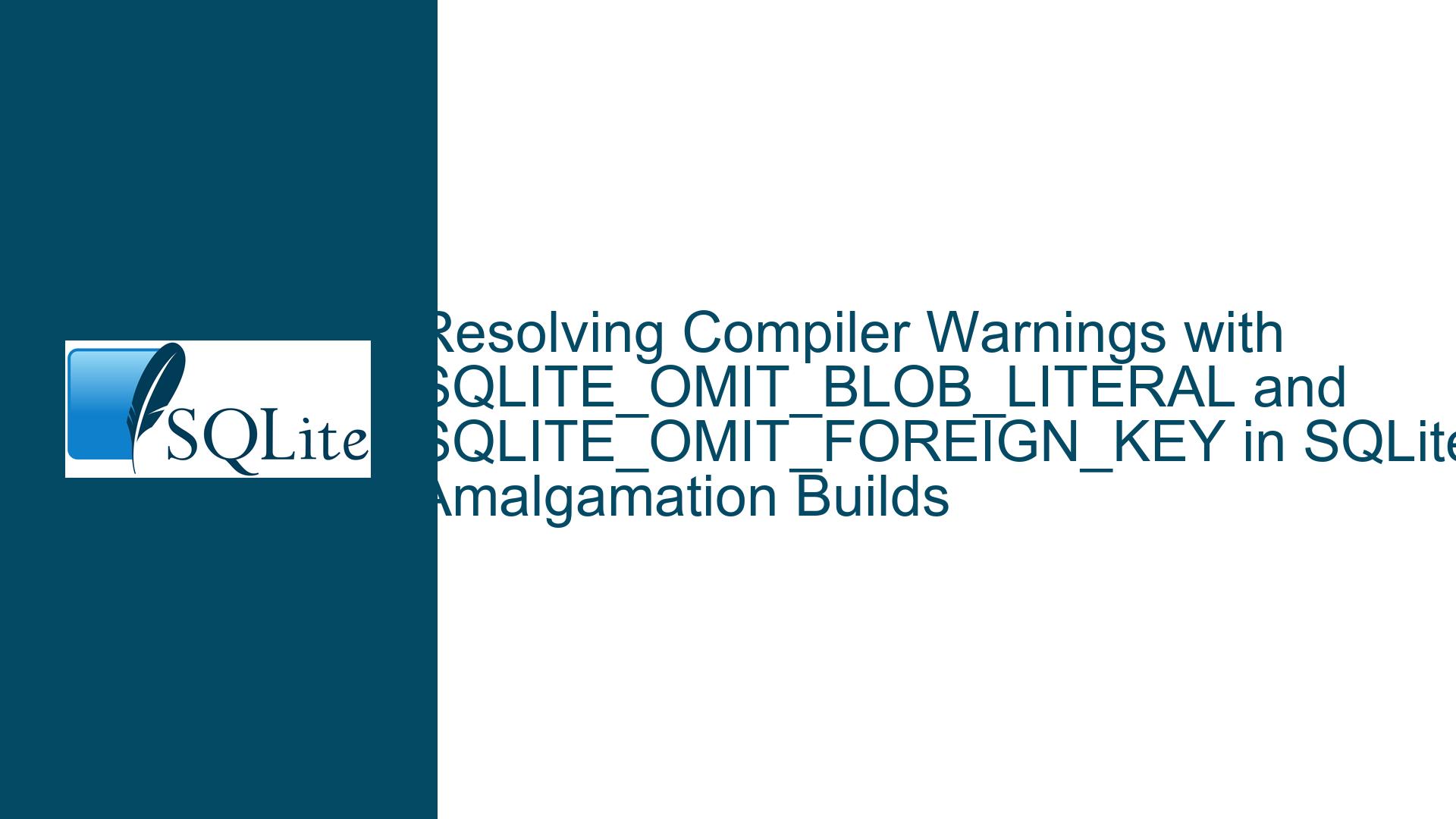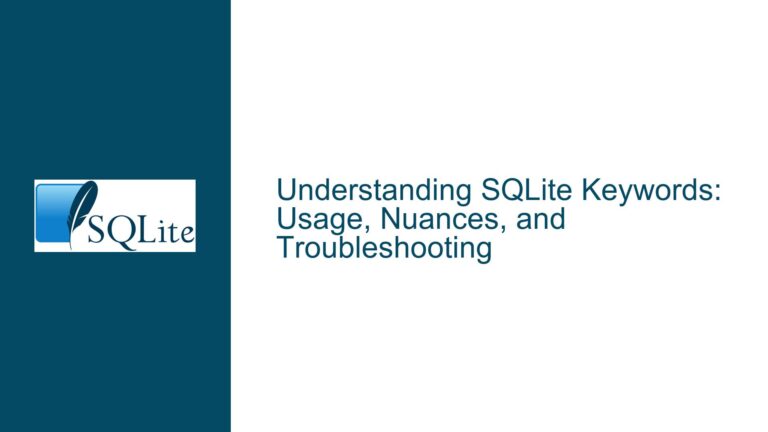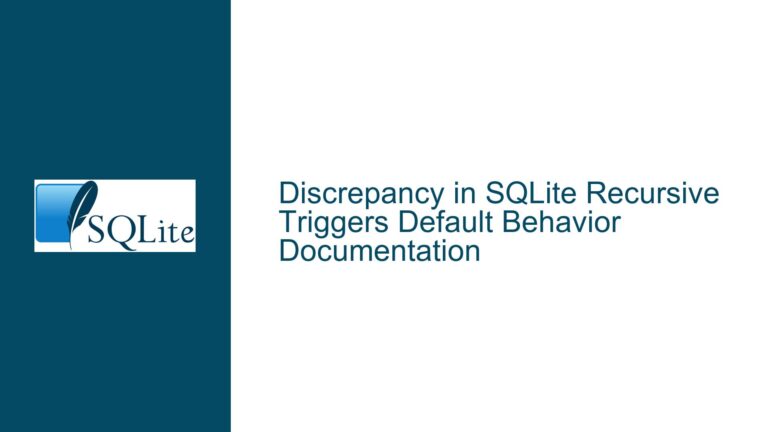Resolving Compiler Warnings with SQLITE_OMIT_BLOB_LITERAL and SQLITE_OMIT_FOREIGN_KEY in SQLite Amalgamation Builds
Static Function Declaration Warnings and Void-Context Macro Expansion in SQLITE_OMIT Configurations
When working with SQLite’s amalgamation build in environments using modern GCC compilers (v10+), developers enabling SQLITE_OMIT compilation flags may encounter two distinct categories of warnings that reveal deeper structural considerations in SQLite’s conditional compilation architecture. The first manifests as a "declared static but never defined" warning for sqlite3HexToBlob() when SQLITE_OMIT_BLOB_LITERAL is defined, while the second appears as a "statement with no effect" warning related to sqlite3VdbeCheckFk() macro expansion under SQLITE_OMIT_FOREIGN_KEY. These warnings indicate mismatches between declaration/definition boundaries and control flow in macro-conditional code paths that require precise handling of preprocessor directives and API surface area management.
The sqlite3HexToBlob() warning demonstrates how function declaration/definition pairs require symmetrical conditional compilation guards, where removing a function’s implementation via #ifdef without correspondingly excluding its prototype leaves dangling declarations that confuse compiler diagnostics. The foreign key warning exposes a more subtle interaction between SQLite’s internal error checking architecture and statement context – a macro designed to return a value becomes syntactically valid but semantically void when expanded in standalone expression context. Both scenarios carry implications for build cleanliness, binary size optimization goals, and long-term code maintenance when using SQLITE_OMIT flags.
Asymmetric Conditional Compilation Guards and Value-Ignoring Macro Contexts
The root cause of the sqlite3HexToBlob() warning lies in SQLite’s header/source structure within the amalgamation build. When SQLITE_OMIT_BLOB_LITERAL is defined, the build excludes sqlite3HexToBlob()’s function definition through #ifdef guards in sqlite3.c. However, the corresponding function declaration in sqlite3.h (or internal headers) lacks matching conditional compilation directives. This creates a declaration without implementation – a violation of the One Definition Rule that compilers detect through static analysis of translation units. Modern GCC versions apply rigorous unused-function checks to static declarations, treating this mismatch as a potential code smell rather than a fatal error.
For the SQLITE_OMIT_FOREIGN_KEY case, the warning emerges from SQLite’s defensive programming practices. The sqlite3VdbeCheckFk() macro normally expands to a function call that performs foreign key constraint checking. When foreign key support is omitted, the macro substitutes a trivial 0 (false) return value. In most usage contexts, this 0 is consumed as a boolean expression in conditionals or assignment statements. However, in the specific location identified near sqlite3VdbeHalt(), the macro expansion exists as a standalone statement: "sqlite3VdbeCheckFk(p, 0);" becomes "0;", which GCC interprets as a no-op instruction. While syntactically valid C (as expression statements are allowed), this triggers compiler warnings about code that executes without observable effect – a strong indicator of potential logic errors in typical software projects.
Deeper analysis reveals these warnings stem from SQLite’s architecture as a configurable, single-file library. The amalgamation build’s design allows extensive feature trimming via OMIT macros but requires meticulous coordination between declaration visibility, implementation inclusion, and usage contexts. When developers enable OMIT flags, they effectively create a custom variant of SQLite that must maintain internal consistency across all API surfaces and control flow paths. The warnings surface areas where this consistency is mechanically enforceable but not automatically guaranteed by the build system – requiring manual intervention or upstream patches to synchronization points between configuration options and code structure.
Comprehensive Code Analysis and Preprocessor Synchronization Techniques
Resolving sqlite3HexToBlob() Declaration/Definition Mismatch
Locate Function Declaration in Header Context
Search the amalgamation source (sqlite3.c) for the "sqlite3HexToBlob" prototype. The declaration appears as:SQLITE_PRIVATE void *sqlite3HexToBlob(sqlite3*, const char *z, int n);This SQLITE_PRIVATE macro expands to static linkage in amalgamation builds, making the function local to the translation unit.
Apply Symmetric Conditional Compilation Guards
Surround both declaration and definition with matching #ifndef SQLITE_OMIT_BLOB_LITERAL blocks:#ifndef SQLITE_OMIT_BLOB_LITERAL SQLITE_PRIVATE void *sqlite3HexToBlob(sqlite3*, const char *z, int n); #endif /* ... Later in the file ... */ #ifndef SQLITE_OMIT_BLOB_LITERAL SQLITE_PRIVATE void *sqlite3HexToBlob(sqlite3 *db, const char *z, int n){ /* Implementation body */ } #endifThis ensures both declaration and definition are excluded when SQLITE_OMIT_BLOB_LITERAL is active.
Verify Transitive Dependency Impact
Investigate all call sites of sqlite3HexToBlob() to confirm they’re properly guarded by SQLITE_OMIT_BLOB_LITERAL. Use compiler’s -Werror=unused-function flag to detect any lingering references. For SQLite’s internal use cases, these call sites should already be conditionalized, but custom modifications might introduce new dependencies.
Eliminating Void-Context sqlite3VdbeCheckFk() Expansions
Analyze Macro Expansion Contexts
Identify all instances where sqlite3VdbeCheckFk() is invoked. Most occur in conditional expressions:if( sqlite3VdbeCheckFk(p,1) ) goto vdbe_halt_cleanup;These safely consume the 0 expansion. The problematic case is a standalone call:
sqlite3VdbeCheckFk(p, 0);Refactor Standalone Macro Invocations
Two approaches exist:Approach 1: Conditionalize Call Sites
Wrap standalone calls in #ifndef SQLITE_OMIT_FOREIGN_KEY to exclude them entirely:#ifndef SQLITE_OMIT_FOREIGN_KEY sqlite3VdbeCheckFk(p, 0); #endifApproach 2: Convert to Void-Cast Expression
Modify the SQLITE_OMIT_FOREIGN_KEY macro definition to include a void cast:#define sqlite3VdbeCheckFk(p,i) ((void)0)This preserves the call site’s syntactic structure while explicitly discarding the result, silencing the warning.
Upstream Codebase Synchronization
For those maintaining private SQLite forks, implement these fixes in the code generation scripts (mkkeywordhash.c, etc.) that produce the amalgamation build. Coordinate with SQLite’s macro architecture to ensure changes persist across version updates. Document the modifications thoroughly to aid future merges from upstream releases.
General Best Practices for SQLITE_OMIT Configurations
Audit Declaration-Definition Pairs
When enabling any SQLITE_OMIT_* flag, perform a comprehensive search for all related function prototypes, global variables, and macro definitions. Use tools like ctags or clangd’s AST analysis to identify declaration/definition pairs that require mutual exclusion.Enable Compiler Sanitizers
Compile with -Wall -Wextra -Werror flags to treat warnings as errors during development. Use -Wunused-function, -Wunused-variable, and -Wunused-parameter to detect residual code artifacts from OMIT configurations. Consider integrating static analyzers like Clang’s scan-build or Coverity for deeper inspection.Validate Feature Interdependencies
Some SQLITE_OMIT flags assume the presence of other features. For example, omitting foreign keys might require reviewing TRIGGER and PRAGMA foreign_key_check handling. Create a cross-reference matrix of OMIT flags and their dependent subsystems using SQLite’s documentation and internal header relationships.Profile Code Size Impacts
Use size analysis tools (nm, size, bloaty) to verify that OMIT configurations actually reduce binary footprint as intended. Some function removals may have minimal impact due to alignment padding or linker behavior. Compare .text segment sizes before/after applying OMIT flags to validate their efficacy.Implement Continuous Integration Checks
Create automated build tests that cycle through all relevant OMIT flag combinations, ensuring each permutation compiles cleanly and passes SQLite’s test suite. Containerize these tests to cover multiple compiler versions (GCC, Clang, MSVC) and target architectures (x86, ARM).
Through meticulous synchronization of preprocessor conditions, context-aware macro transformations, and systematic validation of feature removal impacts, developers can effectively eliminate configuration-induced compiler warnings while maintaining SQLite’s robustness in customized builds. These practices not only address the immediate warnings but fortify the codebase against similar issues when extending or modifying SQLITE_OMIT parameters in future development cycles.






